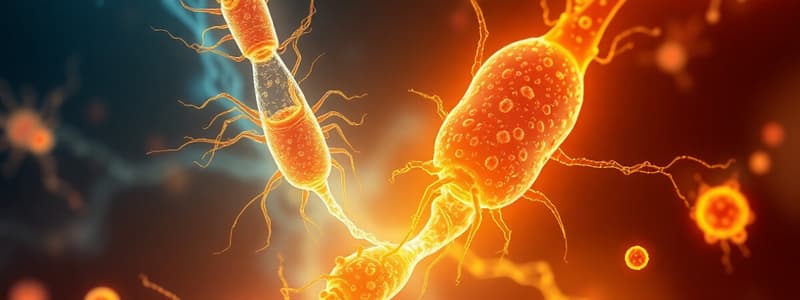Podcast
Questions and Answers
Which life cycle results in the host cell's death?
Which life cycle results in the host cell's death?
- Replication cycle
- Lytic cycle (correct)
- Lysogenic cycle
- Bacteriophage cycle
What happens to the prophage in the lysogenic cycle?
What happens to the prophage in the lysogenic cycle?
- It integrates into the host chromosome. (correct)
- It causes cell death.
- It is expelled from the host cell.
- It produces new virions immediately.
What type of viruses are known to infect bacteria?
What type of viruses are known to infect bacteria?
- Prokaryotic viruses
- Eukaryotic viruses
- Retroviruses
- Bacteriophages (correct)
Which component of a virus aids in the attachment to host cells?
Which component of a virus aids in the attachment to host cells?
Which of the following correctly describes the biosynthesis phase of the lytic cycle?
Which of the following correctly describes the biosynthesis phase of the lytic cycle?
What is a characteristic of virulent bacteriophages?
What is a characteristic of virulent bacteriophages?
During which step of the lytic cycle does the phage inject its DNA into the host?
During which step of the lytic cycle does the phage inject its DNA into the host?
What are the basic components of a virus?
What are the basic components of a virus?
Which type of cycle can bring new genes to the host cell?
Which type of cycle can bring new genes to the host cell?
What is the term for the assembly of viral particles during the lytic cycle?
What is the term for the assembly of viral particles during the lytic cycle?
What occurs during the lytic cycle of a phage?
What occurs during the lytic cycle of a phage?
What is the role of the lambda repressor protein in the lysogenic cycle?
What is the role of the lambda repressor protein in the lysogenic cycle?
Which type of transduction allows for any host gene to be picked up by a phage?
Which type of transduction allows for any host gene to be picked up by a phage?
How does the SOS response affect the lambda phage?
How does the SOS response affect the lambda phage?
What defines a temperate bacteriophage?
What defines a temperate bacteriophage?
During which phase is prophage DNA replicated?
During which phase is prophage DNA replicated?
Which of the following is NOT a characteristic of specialized transduction?
Which of the following is NOT a characteristic of specialized transduction?
Which phage is known for being important in horizontal gene transfer?
Which phage is known for being important in horizontal gene transfer?
What factor is essential for determining whether a temperate phage will undergo lytic or lysogenic pathways?
What factor is essential for determining whether a temperate phage will undergo lytic or lysogenic pathways?
What happens to the host cell during the lytic cycle?
What happens to the host cell during the lytic cycle?
Study Notes
Bacteriophages
- Bacteriophages are viruses that infect bacteria
- Most bacteriophages infect Gram-negative bacteria
- Two main types of bacteriophages:
- Virulent bacteriophages: infect and destroy bacteria through lytic cycle
- Temperate bacteriophages: integrate their DNA into bacterial genome through lysogenic cycle
Lytic Cycle
- Attachment: phage attaches to host cell
- Penetration: phage penetrates host cell and injects its DNA
- Biosynthesis: phage DNA and proteins are produced
- Maturation: phage particles are assembled
- Release: host cell lyses and releases new virions
Lysogenic Cycle
- Phage DNA is incorporated into host DNA as a prophage
- Prophage is replicated along with host DNA
- Viral repressor protein prevents expression of phage genes
- Prophage can bring in new genes to host
- Prophage may mutate and get stuck in the lysogenic cycle
Temperate Bacteriophages
- Can go through either lytic or lysogenic phase
- Lytic phase: phage lyses bacteria
- Lysogenic phase: phage integrates DNA into host genome
Transduction
- The transfer of bacterial genes from one bacterium to another by a bacteriophage
- Two main types:
- General transduction: any host gene can be picked up
- Specialized transduction: phage can pick up adjacent genes during excision
Induction of Lambda
- Lambda phage is a temperate phage that can be induced to enter the lytic cycle by agents that damage DNA
- Agents that damage DNA trigger the SOS response
- SOS response: repair mechanism that removes the Lambda repressor
- Removal of the repressor initiates the lytic pathway proteins leading to new virus production
Studying That Suits You
Use AI to generate personalized quizzes and flashcards to suit your learning preferences.
Related Documents
Description
This quiz explores the fascinating world of bacteriophages, highlighting their structure and the distinct lytic and lysogenic cycles they undergo. It covers the definitions, types, and processes of how these viruses interact with bacteria. Test your understanding of their roles in microbiology and their impact on bacterial evolution.




